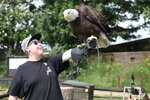You could make a comparison re anglers who want to control Otters and Pigeon Fanciers who want to control Peregrines and Sparrowhawks. Personally I’m 100% against Otter control as like urban Peregrines its a protected species and a conservation success story. Any attempt to change the law for either example would bring fury from the wider general public.
Otters are the tip of the iceberg for me and they bring to light the state of many of our rivers. In some cases, overall lack of fish means a river cannot support the Otter territory , so it raids nearby Carp lakes and even ornamental fish ponds for food!
I have no problem with legal predator control, which is backed up by good science, such as:
- Deer control to improve woodland regeneration. Plus they have no predators in the UK.
- Fox/Corvid Control to protect vulnerable and threatened ground nesting birds of conservation concern e.g. Curlews.
- Non-native American Mink control to save Water Voles and other native wildlife.
- Canada Goose control for public health and water quality issues i.e non-native species crapping everywhere. Plus they completely overgraze fringe weed growth on lakes.
Similar with Cormorants, the problems started when non-native Sinensis Cormorants arrived from the continent several decades back and steadily increased in number. It got to the point where whole inland fisheries were being decimated, so NE brought in a licensing system where they can be shot in small numbers as an aid to scaring. As an example the area licence covering the Ribble is extremely successful and is one reason, why the fish stocks are considered healthy.
The likes of the RSPB, Wildlife Trusts, Woodland Trust and other conservation charities, don't currently object to any of the above legal predator control examples; in fact they actually use some of them.
Neil, many years back when I keepered "Anything" that dared look sideways at a gamebird was eliminated, be it fur or feather. I know of keepers today who still have that old mindset.
As a young kid on the ribble I used to see rows of cormorants lined up across from ribchester front with their wings opened out and held up to dry them after feeding, so they were there in much greater numbers way back when. The otters were also present back then and had never been absent as far as i'm aware. At that time barbel were pretty much unheard of in the ribble and were a kind of urban myth. If I remember rightly I caught my first one about the early to mid 80s which was only about 8 inches long. On that day there was a group of us fishing and everyone came over for a look at the mythical fish lol.
So that kinda indicated that neither the corm's nor the otters did any noticeable damage to the fish numbers.
That was before the barbel had a chance to take hold and explode in numbers. After the barbel explosion the the fish population had a drastic change, the silverfish dropped right down as did the salmon!
I think the sheer number of what was in reality a larger invasive species of fish which must have devoured so much of the natural food and also the spawn of resident fish species that they just couldn't compete, and so their number dropped drastically.....obviously due to the corms

.
I'd say after the peak of the barbel explosion and the older fish started to die off, which was probably about 12 or more years back that the silver fish made a huge comeback.
People needed another scape goat for the barbel slump and it was now the otters turn

.
So atm there is a more even keel between the barbel numbers and the other species.
However, I think the salmon have little to no chance of recovery in the presence of barbel.
IMO, another factor that plays a huge part in fish recruitment is the weather, floods etc.
At this time of year people always moan about low levels etc and how these conditions are detrimental to fish. They don't realise that the low levels increase weed growth, insect, etc etc and the fry are able to thrive in those conditions. I think we've had several years of quite decent recruitment years these last few years, but previous to that we had few years worth of high water levels during the peek breeding seasons which must have decimated the fry. Obviously that will cause lean years of recruitment which is just a natural occurance and not a result of predators which i'm sure you will know are going to be the first to feel the brunt of any lack of food, and also the first to be blamed for the lack of fish to catch.
So, the above is my own thoughts and opinions, others will disagree.

